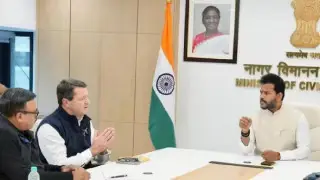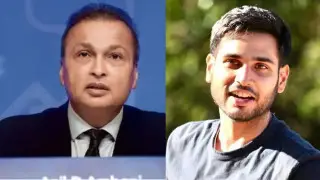
Courtesy: Bhaskar
The Union Budget in India is a pivotal economic event that shapes the nation's fiscal path for the upcoming financial year. As Finance Ministers take the podium, the country awaits announcements that range from tax reforms to social welfare allocations. Here are 10 interesting facts about the Union Budget that reflect its historical significance and evolution.
The first-ever Union Budget was presented on April 7, 1860, by Scottish economist James Wilson from the East India Company. This landmark budget introduced income tax, which remains a major revenue source for the government to this day.
After India gained independence, R K Shanmukham Chetty, the Finance Minister, presented the first budget on November 26, 1947, marking a crucial milestone in the nation's financial journey.
Finance Minister Nirmala Sitharaman holds the record for delivering the longest budget speech in Indian history. During the presentation of the Union Budget for 2020-21 on February 1, 2020, she spoke for an impressive two hours and 42 minutes.
In terms of word count, the record for the longest budget speech goes to Manmohan Singh in 1991, using 18,604 words. Arun Jaitley closely follows, delivering a speech with the same word count in 2018.
The distinction for the shortest budget speech goes to Hirubhai Mulljibhai Patel, the Finance Minister during the Moraji Desai government in 1977. His succinct speech consisted of just 800 words.
Morarji Desai, former Prime Minister, holds the record for submitting the most budget proposals in India's history. During his tenure as Finance Minister from 1962 to 1969, he presented 10 budgets.
Until 1999, the Union Budget was presented at 5 pm on the last working day of February. Yashwant Sinha, the Finance Minister in the Atal Bihari Vajpayee government, changed the timing to 11 am in 1999.
Till 1955, the Union Budget was exclusively presented in English. However, the Congress government decided to print Budget documents in both Hindi and English, enhancing accessibility.
In response to the Covid-19 pandemic, the budget for 2021-22 became entirely digital, marking a historic moment for Independent India's budgetary process.
After Indira Gandhi, who presented the budget for the fiscal year 1970-1971, Nirmala Sitharaman became the second woman to take on this significant role in 2019.
The Union Budget's journey from its inception in 1860 to the digital age reflects the dynamic nature of India's economic landscape, with each budget leaving an indelible mark on the nation's progress.













Copyright © 2025 Top Indian News
